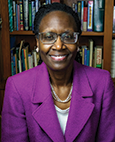 I have always been fascinated by the prescience and timelessness of W.E.B. Du Bois’ classic, “The Souls of Black Folk.” In the 1903 publication, the legendary Du Bois explored the philosophical-cum-spiritual dimensions of the then emancipated Black people, coupled with the needed societal changes tying them together through a prescient view of society and in dual identity and double-consciousness.
I have always been fascinated by the prescience and timelessness of W.E.B. Du Bois’ classic, “The Souls of Black Folk.” In the 1903 publication, the legendary Du Bois explored the philosophical-cum-spiritual dimensions of the then emancipated Black people, coupled with the needed societal changes tying them together through a prescient view of society and in dual identity and double-consciousness.
Du Bois argued that Black people were a sort of seventh son, born with a veil but gifted with second sight in this American world that yielded to him no true self-consciousness, only allowing him to see himself through the revelation of the other world. In essence, it is a peculiar sensation, indeed the double-consciousness, that, according to Du Bois, was a “sense of looking at one’s self through the eyes of others, of measuring one’s soul by the tape of a world that looks on in amuse[ment], contempt, and pity.”
“In the Academy, one consequence is a revolving door of Black faculty and staff, who have become homeless in an otherwise spacious Academy, as well as Black students whose academic careers are either undermined or cut short for lack of Black role models. This leaves us with, sadly, an Academy and society bereft of the knowledge and creative activity that Black faculty and staff offer. ”
Interestingly, the veil that Du Bois wrote about still exists today, especially in the American Academy — the network of colleges, universities, associations, and organizations that provide and support higher education — despite the fact that some of America’s most illustrious educational institutions are headed by Black provosts and presidents. In 1903 and today, many Black people could see the unearned advantages and opportunities associated with Whiteness, although research and public opinion polls continue to document how White people and White-adjacent groups are reportedly unable to see the disadvantages or choose not to see the unearned disadvantages and inequities associated with Blackness.
In the Academy, one consequence is a revolving door of Black faculty and staff who have become homeless in an otherwise spacious Academy, as well as Black students whose academic careers are either undermined or cut short for lack of Black role models. This leaves us with, sadly, an Academy and society bereft of the knowledge and creative activity that Black faculty and staff offer.
As a tenured full professor of political science, a former director of graduate studies and admissions, dean, and now vice president for diversity, I view the crisis of Black faculty and staff retention in the Academy as a quiet earthquake — slowly moving beneath the ground, embodying the terrors that make academic life untenable. But quiet earthquakes don’t remain quiet. They eventually give way to larger, more destructive movements that shatter foundations, communities, and the very lives that we hold dear.
Warning Signs
For almost 50 years, research on Black faculty and staff retention has offered impactful warning signs as it chronicled racialized and inequitable working conditions, inhospitable climates, lack of physical and psychological safety, poor accountability in helping to usher in the needed institutional change, lovelessness, and the lack of consistent focus on using the tremendous resources of the Academy to serve the public good. While rich in insight, the scholarship on Black faculty and staff retention has often been segregated from public discussions that university presidents, futurists, and higher education researchers are having about institutional transformation in the Academy.
However, just as quiet earthquakes foreshadow major earthquakes, the revolving doors of Black faculty and staff on predominantly White college and university campuses indicate warning signs of danger to come. Many of these dangers are already here in the form of general strikes among faculty, graduate students, and staff, accentuated by declining high school graduation rates, campus shootings that threaten physical and psychological safety, the ongoing defunding of public higher education, burnout, and mass resignations of faculty and staff in the Academy that mirror those of activists, legislators, and courts.
The literature on Black faculty and staff retention is filled with these issues and concerns that Black faculty and staff have either been predicting or experiencing for decades. Consequently, there are new calls for transformation in the American Academy from within and without, but while the need for change is urgent, the recipe for change must get to the root of the issues at hand rather than taking an approach that is merely reactionary.
My forthcoming book, “The SOULS of Black Faculty and Staff in the American Academy: Principles for Transformation and Retention,” weaves together fiction and interdisciplinary research to demonstrate how SOULS — or safety, organizational accountability, unvarnished truth telling, love, and spirituality — are all crucial ingredients in reimagining an American Academy that leverages the talents and brilliance of Black faculty and staff as essential elements in not only transforming the Academy into a more relevant and humane institution but creating a better world.●

Yvette Alex-Assensoh, PhD, JD, is professor of political science, adjunct professor of law, and vice president for equity and inclusion at the University of Oregon. She is the author/co-author of seven books, including the forthcoming “The SOULS of Black Faculty and Staff in the American Academy: Principles for Transformation and Retention” (Palgrave Macmillan, 2023).
This article was published in our October 2023 issue.




















